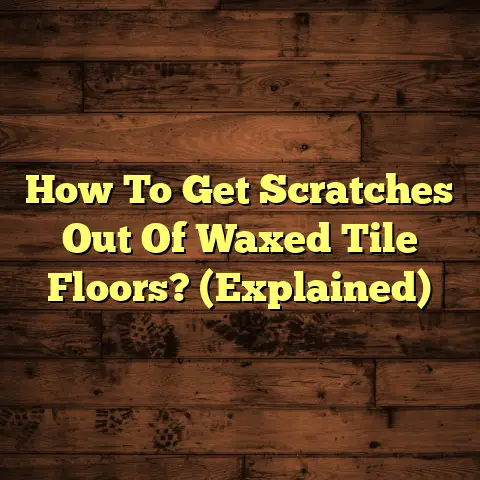How Much Should Flooring Cost (Explained)
Hardwood flooring is a timeless choice for homeowners and businesses alike, known for its beauty, durability, and value. However, understanding the cost of installing hardwood flooring can be complex. This article delves into various factors that influence the overall cost, providing a detailed breakdown to help you make informed decisions.
Major Cost Factors Impacting Hardwood Flooring Installation
When estimating the cost of hardwood flooring installation, several key factors come into play:
1. Area Size
The size of the area to be floored is one of the most significant factors affecting cost. Flooring is typically priced per square foot, so larger areas will naturally incur higher costs.
2. Hardwood Type
Different types of wood come with varying price points. Common types include:
- Oak: Generally affordable and widely used.
- Maple: Slightly more expensive, known for its durability.
- Cherry: Offers rich color and warmth, but at a higher price point.
- Walnut: Luxurious and costly, prized for its appearance.
3. Labor Costs
Labor costs can vary significantly based on geographic location and the complexity of the installation. Professional installation typically ranges from $3 to $8 per square foot.
4. Additional Considerations
Several other aspects can influence the final cost:
- Floor Removal: If existing flooring needs to be removed, this can add $1 to $3 per square foot.
- Subfloor Replacement: If the subfloor is damaged or requires upgrading, expect additional costs between $1 to $4 per square foot.
- Material Grade: Higher-grade materials increase costs—selecting premium or exotic woods will raise your budget considerably.
- Room Size/Layout: Complex layouts or unusual room shapes may require more cutting and fitting, impacting labor costs.
- Installation Type: Different methods (nail-down, glue-down, or floating) can affect both material and labor costs.
Detailed Cost Breakdown
Here’s a more granular look at potential costs associated with hardwood flooring installation:
Cost Estimates by Project Size
| Project Size | Estimated Cost (Materials + Labor) |
|---|---|
| Small Room (100 sq ft) | $1,000 – $2,500 |
| Medium Room (300 sq ft) | $3,000 – $7,500 |
| Large Room (500 sq ft) | $5,000 – $12,500 |
Cost Estimates by Hardwood Type
| Wood Type | Estimated Cost per Sq Ft (Materials Only) |
|---|---|
| Oak | $3 – $8 |
| Maple | $4 – $10 |
| Cherry | $5 – $15 |
| Walnut | $6 – $20 |
Material Grades
Hardwood flooring comes in various grades which also affects cost:
- Clear Grade: The highest quality with minimal imperfections; typically costs more.
- Select Grade: Slightly less perfect than clear grade but still high-quality.
- Common Grade: More imperfections; offers a rustic look and lower price.
Comparing Hardwood vs Alternative Flooring Options
When choosing flooring, it’s essential to consider alternatives. Here’s a comparison of hardwood against other popular flooring options:
| Flooring Type | Cost per Sq Ft (Materials Only) | Durability | Maintenance |
|---|---|---|---|
| Hardwood | $3 – $20 | High | Moderate |
| Laminate | $1 – $5 | Moderate | Low |
| Vinyl | $2 – $7 | High | Low |
| Carpet | $1 – $5 | Low | High |
Signs Your Hardwood Floors Need Replacement
Not all issues with hardwood floors necessitate replacement. Here are some signs to consider:
- Severe Scratches and Gouges: Extensive damage may warrant replacement rather than refinishing.
- Warping or Buckling: This often indicates moisture issues that can compromise the integrity of the wood.
- Persistent Creaking or Squeaking: While minor noises can often be fixed, significant movement may signal deeper issues.
Refurbishing vs. Replacing Hardwood Floors
When deciding between refinishing and replacing hardwood floors, consider:
Refinishing
- Pros: Cost-effective; restores appearance; less waste.
- Cons: Limited to floors that are still structurally sound; may not address underlying issues.
Replacement
- Pros: Opportunity for new styles; can address subfloor problems.
- Cons: Higher cost; more disruptive.
Pros and Cons of Hardwood Flooring
Pros
- Timeless aesthetic appeal.
- Increases property value.
- Durable and long-lasting with proper care.
Cons
- Higher initial cost compared to some alternatives.
- Susceptible to scratches and dents.
- Requires periodic maintenance and refinishing.
Professional Installation vs. DIY
Choosing between professional installation and a DIY approach can significantly impact your budget. Here’s a comparison:
Professional Installation
- Cost: Generally $3 – $8 per sq ft for labor.
- Benefits: Expertise ensures proper installation; typically comes with warranties.
DIY Installation
- Cost: Savings on labor but requires upfront investment in tools (saws, nail guns).
- Skills Required: Must be comfortable with carpentry tools; mistakes can lead to costly fixes.
Questions to Ask Hardwood Flooring Contractors
When hiring a contractor, ensure you ask these critical questions:
- What is your experience with hardwood flooring?
- Can you provide references or portfolio examples?
- What types of warranties do you offer?
- How do you handle subfloor issues?
- What is your estimated timeline for completion?
Hardwood Floor Care and Maintenance Tips
To maximise the longevity of your hardwood floors, consider these care tips:
- Regular Cleaning: Sweep or vacuum regularly to remove dirt and debris.
- Avoid Excess Water: Use a damp mop instead of soaking wet to prevent warping.
- Use Rugs in High-Traffic Areas: Protect floors from wear.
- Reapply Finish as Needed: Depending on traffic levels, this could be every 5-7 years.
By understanding the various costs associated with hardwood flooring installation and maintenance, homeowners can make informed choices that align with their budgets and aesthetic preferences. Whether you opt for professional installation or choose to tackle the project yourself, the right preparation and knowledge will lead to beautiful results that enhance your space for years to come.





